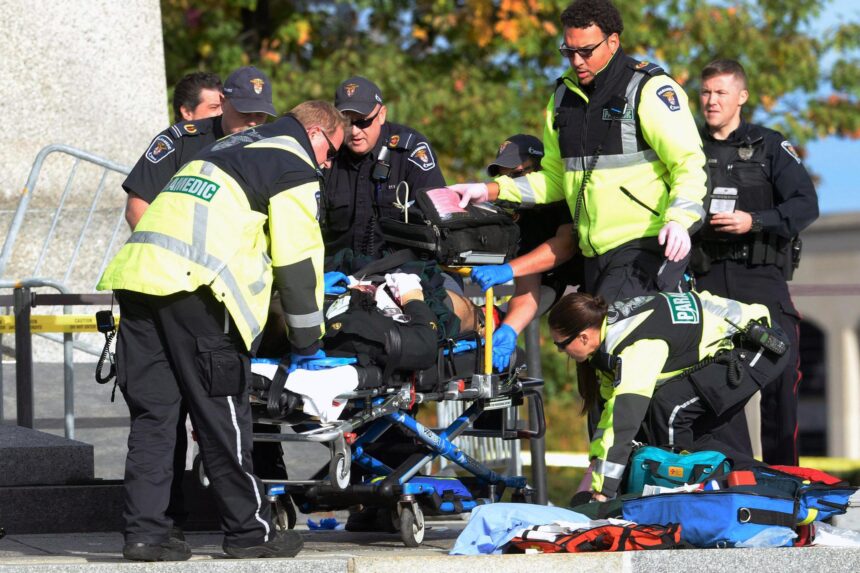Title: A Decade Later: Evaluating Canada’s Response to Political Violence Post-Parliament Hill Shooting
On October 22, 2014, a devastating incident shook the foundations of Canada’s democracy when an armed assailant invaded Parliament Hill, leading to the tragic death of a soldier and triggering a lockdown at the heart of Canadian governance. As we mark the 11th anniversary of this somber event, it is crucial to assess whether Canada has effectively addressed political violence and implemented adequate protections for public officials and citizens. The rise in extremist ideologies, heightened societal polarization, and rampant online hate speech have intensified scrutiny on how well the state is equipped to counter threats against democratic values. This article delves into both progress made and gaps remaining in Canada’s strategies for combating political violence since that fateful day.
Analyzing Canada’s Political Landscape and Its Exposure to Violence
In recent years, Canada has experienced an alarming increase in divisive language and political discord that heightens the risk of violent acts. Experts attribute this trend to several factors, notably the role of social media, which facilitates misinformation dissemination while amplifying extremist narratives. Furthermore, growing polarization among political factions has fostered an environment where dissenting opinions are not only discouraged but sometimes actively targeted. As Canadians reflect on lessons learned from the Parliament Hill shooting in 2014, many are left questioning whether current measures adequately address these rising tensions.
The response from governmental agencies and law enforcement has been varied; however, significant challenges remain unaddressed. Key strategies such as community involvement, prompt intelligence sharing, and mental health resources have been identified as vital components in tackling these threats effectively. Nevertheless, experts emphasize that sustained efforts must be comprehensive enough to encompass diverse communities while being rooted in a thorough understanding of what drives political violence. In evaluating these developments critically involves considering:
- Government Initiatives: Policies designed to curb hate speech while fostering constructive dialogue.
- Community Programs: Efforts aimed at building connections across different demographic groups.
- Law Enforcement Training: Educational programs focused on identifying early signs of radicalization.
Scrutinizing Legislative Actions and Law Enforcement Readiness
The past eleven years have seen increased discussions regarding Canada’s legislative framework addressing political violence. While laws like the Anti-Terrorism Act alongside amendments to the Ciminal Code , aimed at enhancing public safety exist; critics argue that more effective frameworks are necessary for meaningful change. They stress not just reactive measures but also proactive policies targeting root causes such as hate speech while promoting community engagement as preventive strategies.
The preparedness level within law enforcement remains concerning despite investments by federal and provincial agencies into training programs along with intelligence-sharing systems; ongoing communication deficits coupled with resource limitations continue impeding effective responses. Law enforcement must evolve alongside modern threats by prioritizing interdisciplinary collaboration along with mental health support for officers involved in high-stress situations. The following elements emerge as essential components within an effective policing strategy:
- Sophisticated Intelligence Gathering: Leveraging advanced technologies for threat anticipation.
- Civic Policing Approaches: Building trustful relationships within communities aimed at preventing radicalization.
- Cohesive Interagency Collaboration: strong > Streamlining communication channels between local municipalities up through federal levels. li >
| Main Challenge | Your Response Strategy th > | |
|---|---|---|
| Surge In Hate Crimes td > | Stricter legislation surrounding hate speech .< /td > < /tr > | |
| Resource Constraints .< /td > | Advocacy For Increased Funding And Training .< /td > < /tr >< tr >< td>Lack Of Community Trust.< /td >< td />Implementing Outreach Initiatives.< /td > tr > tbody > table > Building Community Resilience Through Dialogue Against ExtremismThe aftermath following Parliament Hill’s tragedy highlighted Canada’s urgent need for community engagement as part of its national security strategy framework Local organizations alongside grassroots movements have emerged focusing on strengthening ties among diverse populations aiming towards resilience through collaboration paired with open dialogues empowering individuals confronting radicalization early on By fostering awareness amongst various cultural groups these initiatives strive towards creating robust networks capable standing firm against extremism’s encroachment . p > A range key strategies adopted mitigate risks associated with politically motivated violence include : p >
|









